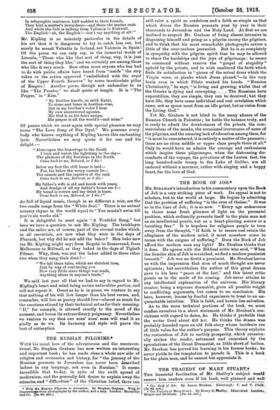THE BOOK OF JOB.*
Ma. STRAHAN'S introduction to his commentary upon the Book of Job is a very striking piece of work. Its appeal is not to scholars, but to the world at large. He begins by admitting that the problem of suffering "is the crux of theism." It was so in the time of Job ; it is so now. " Every age endeavours to throw some fresh glimmer of light on the perennial problem, which ordinarily presents itself to the plain man nob as an intellectual puzzle, but as a heart-piercing sorrow or a haunting fear." It is hopeless for religious people to turn away from the. thought, " If faith is to secure and retain the allegiance of the modern mind, it must somehow come to terms with the enigma of suffering." Does the Book of Job afford the modern man any light? Mr. Straban thinks that it does. He agrees with the Biblical critic who said, " When the Semitic skin of Job is scratched, we find a modern pessimist beneath." Job was no doubt a pessimist. Mr. Strahanleaves us with the impression that men of much thought are never optimists ; but nevertheless the author of this great drama gave to his hero " peace at the last," and this latest critic points us to the mode of its coming. Job never attains to any intellectual explanation of the universe. His literary creator, being a supreme dramatist, gives all possible weight to conflicting arguments, but comes to no conclusion. Hie hero, however, learns by fearful experience to trust to an un- quenchable intuition. This is faith, and herein lies salvation.
As to the more technical portions of the book, we must confine ourselves to a short statement of Mr. Straban's con- victions with regard to dates, &c. He thinks it probable that the writer lived about 450 B.C. He thinks the drama was probably founded upon an old folk-story whose incidents are of little value for the author's purpose. This theory explains the restoration of Job to earthly prosperity, which occasion- ally strikes the reader, entranced and enmeshed by the speculations of the Great Dramatist, as little short of bathos. Mr. Straban has proved his learning in his former books; he never yields to the temptation to parade it. This is a book: for the plain man, and he cannot but appreciate it.














































 Previous page
Previous page